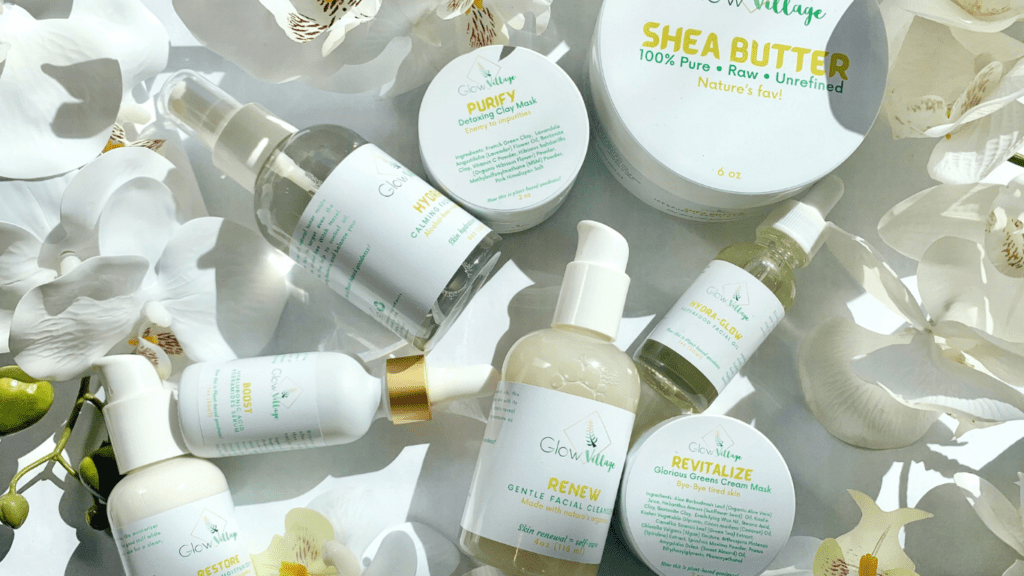What Is Organic Skincare?
Organic skincare refers to products made from natural ingredients grown without synthetic pesticides, herbicides, and fertilizers. These products often carry certifications to ensure they meet organic farming standards. The focus is on using plant-based ingredients that are free from harmful chemicals.
Certified organic skincare products usually display labels from recognized organizations like the USDA or COSMOS. These certifications guarantee that a significant percentage of the product’s ingredients are organically produced. For instance, to earn the USDA Organic seal, a product must contain at least 95% organic ingredients.
Common components in organic skincare include essential oils, plant extracts, and natural butters. Examples of these ingredients are lavender oil, aloe vera, and shea butter. These components are reputed for their skin benefits like hydration, soothing properties, and antioxidant effects.
Organic skincare also emphasizes sustainability and environmental responsibility. Packaging often utilizes recyclable materials to minimize environmental impact. Brands commit to cruelty-free practices and avoid using animals in testing.
This approach not only benefits skin health but also supports eco-friendly and ethical farming practices. When I consider organic skincare products, I look for certifications and ingredient lists to verify their authenticity.
Benefits of Organic Skincare
Organic skincare offers several advantages over conventional products. It provides a natural and more eco-friendly approach to skin health.
Natural Ingredients
Organic skincare relies on natural ingredients. These components, like aloe vera, chamomile, and tea tree oil, are known for their soothing and healing properties. Because these ingredients are grown without synthetic pesticides or fertilizers, they retain higher levels of beneficial vitamins and antioxidants that nourish the skin. This results in more effective hydration and rejuvenation.
Fewer Chemicals
Organic skincare contains fewer harmful chemicals.
Unlike conventional skincare, which often includes:
- parabens
- sulfates
- synthetic fragrances
- organic products minimize exposure to these substances.
Reducing chemical exposure decreases the risk of skin irritation, allergic reactions, and long-term damage. Organic formulations use gentle, non-toxic preservatives, ensuring that the skincare routine is both safe and effective.
Environmental Impact
Organic skincare promotes a lower environmental impact. Manufacturing these products uses sustainable methods that protect ecosystems and reduce pollution. For instance, organic farming practices enhance soil health and reduce water contamination. Additionally, many organic brands focus on sustainable packaging, such as recyclable or biodegradable materials, minimizing waste. By choosing organic, consumers support a more eco-friendly and responsible approach to skincare.
Potential Drawbacks of Organic Skincare

Certain drawbacks associated with organic skincare need consideration before making a switch.
Cost Factor
Organic skincare products often come with higher price tags. This price premium roots from organic farming practices and sustainable packaging. For instance, organic lotions or serums can cost 20% to 50% more than their non-organic counterparts.
Limited Shelf Life
Organic products generally have shorter shelf lives. Lack of synthetic preservatives accelerates this process. A typical organic cream might last 6 to 12 months compared to 24 months for a conventional one.
Potential Allergies
Organic ingredients can cause allergic reactions in some individuals. Natural extracts like lavender or nuts, for example, might trigger skin irritation. Patch tests become essential when using new organic products to avoid adverse reactions.
Comparing Organic and Conventional Skincare
Organic and conventional skincare products differ significantly in their formulation, user experience, and effects on skin health. Understanding these differences can help make informed choices about which type of skincare is better suited for individual needs.
Ingredient Analysis
Organic skincare products use natural ingredients like essential oils, plant extracts, and minerals. These products avoid synthetic chemicals, parabens, phthalates, sulfates, and artificial fragrances. For instance, organic creams might contain ingredients like jojoba oil and rose water, which are known for their hydrating properties.
Conventional skincare products, on the other hand, commonly include synthetic ingredients designed for longer shelf life, enhanced texture, and immediate results. These can include silicones, petroleum derivatives, and artificial colorants. Synthetic preservatives like parabens are often used to extend shelf life, which is beneficial for commercial distribution but may cause skin irritation for some users.
User Experience
Organic skincare products generally offer a more pleasant experience due to their natural scents and textures.The absence of artificial fragrances means fewer chances of allergic reactions. However, the textures might be less smooth or homogenous compared to conventional products due to the lack of synthetic emulsifiers.
Conventional skincare products often provide a more luxurious feel. Silicones, for example, give a smooth and silky texture, creating an immediate sensation of softness. Fragrances in these products, though appealing, can sometimes lead to irritation, especially for sensitive skin types.
Effectiveness on Skin Health
Organic skincare can benefit the skin over the long term by nourishing it with vitamins, antioxidants, and natural moisturizers. Ingredients like green tea extract and elderflower offer anti-inflammatory and regenerative benefits. However, the effectiveness of organic skincare can vary based on ingredient purity and individual skin types.
Conventional skincare products may deliver faster results due to the inclusion of potent active agents like retinoids and hydroquinone. These can effectively treat issues like acne or hyperpigmentation but may also cause side effects like redness and dryness with prolonged use. For skin maintenance and anti-aging, synthetic peptides and ceramides in conventional products are highly effective.
Tips for Choosing the Right Skincare Products
Selecting the best skincare products calls for careful consideration of various factors. Following these tips can make the process simpler and more effective.
Reading Labels
Understanding skincare product labels is essential. Ingredients are typically listed in descending order by weight, with the highest concentration first. Look for key natural ingredients like:
- aloe vera
- chamomile
- essential oils
Avoid products with parabens, sulfates, and synthetic fragrances, which can irritate sensitive skin. Certification labels like USDA Organic or ECOCERT indicate that the product meets organic standards, ensuring authenticity.
Conducting Patch Tests
Always perform a patch test when trying new skincare products.
- Apply a small amount of the product to a discreet area, like the inside of your wrist or behind your ear.
- Wait 24-48 hours to see if any irritation, redness, or itching occurs.
- If no reaction happens, the product is likely safe for your skin.
This step helps prevent adverse reactions, especially with products containing essential oils or active botanicals.
Consulting Dermatologists
Seeking advice from a dermatologist can provide personalized skincare recommendations.
Dermatologists analyze your skin type, address specific concerns, and suggest suitable products.
This professional guidance ensures that you select products tailored to your needs, avoiding those that may exacerbate skin issues. Regular consultations can help adjust your skincare routine as your skin’s needs evolve.


 Bonnie Brown is an expert in holistic wellness with over a decade of experience in natural health and skincare. She has dedicated her career to helping individuals achieve radiant health through plant-based solutions and mindful self-care practices. Bonnie is passionate about blending ancient traditions with modern wellness techniques, making her insights a valuable resource for anyone on a journey to healthier skin and overall well-being.
Bonnie Brown is an expert in holistic wellness with over a decade of experience in natural health and skincare. She has dedicated her career to helping individuals achieve radiant health through plant-based solutions and mindful self-care practices. Bonnie is passionate about blending ancient traditions with modern wellness techniques, making her insights a valuable resource for anyone on a journey to healthier skin and overall well-being.
